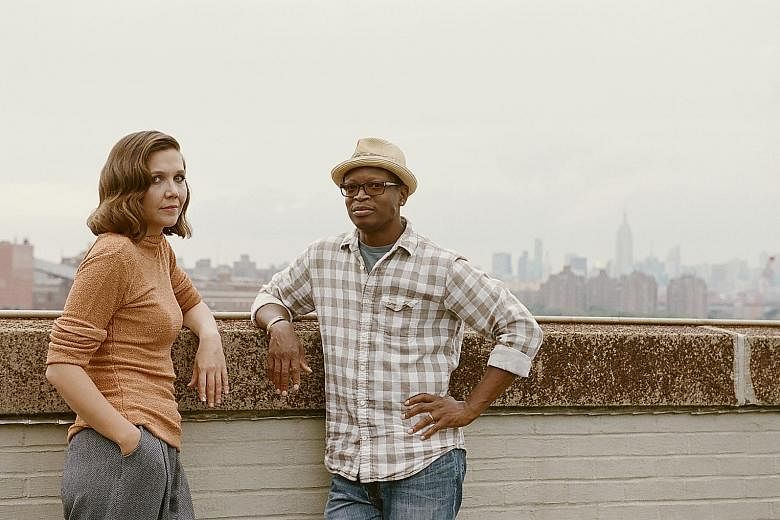NEW YORK • In a crowded warehouse somewhere in Brooklyn, the men are wearing garish leisure suits and ties as wide as dinner napkins, while the women affect a look that might be called Woodstock-aGo-Go. They are all part of an acid flashback to the early 1970s, courtesy of The Deuce, an HBO series about the New York sex industry that once defined 42nd Street.
The scene being shot has Candy (Maggie Gyllenhaal), an astute prostitute with aspirations, and Marty Hodas (Saul Stein), the real-life King of the Peeps, discussing what predilections are the most lucrative. The counting of endless quarters in an adjacent room underscores the economic opportunities.
Monitoring the shoot from a room downstairs, the show's creators, David Simon and George Pelecanos, begin to deconstruct Stein's delivery of a particular line. Does he come off as leering? Dismissive?
"I want him to be genuinely, 'You get it, you're smart,'" Pelecanos says.
So they do another take. And another.
The moment encapsulates a central challenge: to explore the repercussions of a business dependent upon the sale of the flesh through storytelling that never slips into preachy puritanism or flat-out pornography. Also at play is a heightened awareness of how women are portrayed in culture, reflected in criticism of HBO shows such as Game Of Thrones and Westworld for what some say is the gratuitous female nudity and violence against women.
Now here comes a show about New York's sex trade that can neither soft-pedal the brutal realities nor exploit the exploitation.
"If you allude to this in ways that clean it up, you're not dealing with the fact that not only was labour marginalised and misused, but that the product itself was the labourer," Simon says. "Human beings were the product."
HBO has a lot riding on The Deuce, which makes its debut on Sept 10 with a cast led by Gyllenhaal and James Franco. The premium cable network needs an attention-getting hit to replace the departing Game Of Thrones. Its previous New York 1970s offering, Vinyl (2016), was cancelled after one season.
Simon and Pelecanos, long-time collaborators on standard-setting televised narratives, initially had no interest in developing a series around 42nd Street, nicknamed The Deuce, believing that there was little left to be said.
Simon, a former newspaper reporter, has created and nurtured several enduring series, most notably the HBO drama The Wire (2002-2008), which explored Baltimore through its illegal drug trade. Pelecanos, a prolific novelist known for his detective fiction, worked with Simon on The Wire and another HBO series, Treme (2010-2013), which focused on New Orleans in the aftermath of Hurricane Katrina.
But Marc Henry Johnson, an assistant locations manager on Treme, encouraged them to meet a man he knew in New York.
The man, whose name the two writers declined to reveal, vividly resurrected the pioneering days along The Deuce, when he and his twin brother became mob fronts for bars and massage parlours in the demimonde of Midtown.
"The characters were so rich, and that's what it all comes down to," Pelecanos recalled. "We just said we have to do this."
They returned to hear more insider information about a pivotal moment in American cultural history, when various factors, including changes in the legal definition of obscenity, transformed the sex business into a billion-dollar enterprise. Once a wink-wink commodity kept behind the counter in paper bags, it was now front and centre in Times Square.
To be fair, The Deuce was never exactly demure. Its "naughty, bawdy, gaudy, sporty" nature was celebrated at least as early as 1932 in the Al Dubin and Harry Warren song 42nd Street. But Mayor Fiorello H. LaGuardia eventually closed down the burlesque houses, the dawn of hypnotising television came soon after and the district's theatres devolved into porn palaces, their marquees challenging goofy adolescents to decode a film title's lusty pun.
By the mid-1970s, dozens of sex-related businesses dominated the seedy bottom of Times Square, reflecting an era of free expression and a city in crisis, its fiscal problems deepening, its crime rate rising. And this man spinning stories for Pelecanos and Simon had been in the mix of it all.
They were especially intrigued by how often he deftly sidestepped any responsibility for a cold-blooded business that financially benefited a few at the expense of many.
And if they asked him whatever happened to so and so, Simon said: "The answer was never 'She married a podiatrist, moved to Scarsdale and had two kids.'"
The co-creators wanted to avoid any lapse into what Simon called "the boys' version of the sex industry". He said the writers, directors and actors engaged in intense, scene-by-scene discussions during the shooting of the first season's eight episodes. Gay and transgender writers contributed to the teleplays, women directed four of the episodes, and Gyllenhaal, one of the producers, shared her notes on scripts and edits of episodes.
Despite the concerns about prurience, the actress said she saw multilayered opportunity in the subject matter. If people are somehow aroused by the matter-of-fact portrayal of the porn business, she said, how will they feel when also exposed to the complicated back stories? Someone, for example, like Candy: a single mother, a daughter, a sister.
"Then all of a sudden you're both feeling and thinking at the same time," she said. "If we create something that is both things at once, then I think it gets people involved viscerally in the show."
NYTIMES

